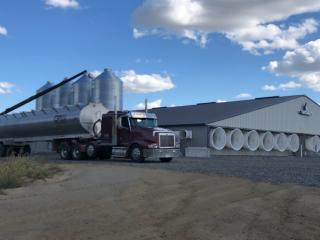Blog
The 350 Barn Mission: Why We Chose Nebraska For Our First Barn
A few weeks ago we sat down with a potential investor, who asked “Why Nebraska, why 350 barns?”


By Paul Koenig
A few weeks ago we sat down with a potential investor, who asked “Why Nebraska, why 350 barns?”
Our CEO Paul Koenig answered, “Nebraska is underbuilt, it’s almost like virgin territory, it’s like the new Wild West.” From Governor Ricketts on down, they want to promote livestock and growth because they have the land, they have the processing plants, and they have the desire. More importantly, Nebraskans want innovation, and they are willing to invest in it.”
For these reasons, we’ve chosen Nebraska to build our proof-of-concept location and a network of 350 barns to gain initial traction. By delving into the specifics, we hope to inspire you to join us in making our 350 barn mission a reality.
Nebraska is Close to Packing Plants and Has an Abundant Corn Supply
Nebraska supplies key criteria necessary for efficient and profitable protein production, such as close proximity to packing plants and cornfields. In order for a high-tech high-yield pig barn to operate at full potential, it has to have sufficient packing plant capacity, called shackle spaces, within a two or three-hour drive. Nebraska currently has five close proximity packing plants in operation to support our barns.
Another necessary ingredient is plenty of corn. Nebraska sows cornfields from border to border. Currently, a large percentage of the corn fed to pigs in the US comes from Brazil. In Paul’s words,
“We Americans produce 73% of all the #2 yellow corn in the world so why are we shipping this type of corn from Brazil up here? It really doesn’t make any sense when it is available in our own backyard.”
Rather than relying on Brazil’s corn, a network of farms, barns, and packing plants located in a close-proximity radius is far more sustainable. It’s easier and much cheaper when corn production is closer to the point of consumption. The same can be said for the proximity of the growing facility to the packing plant. The financial bonus with Viroment barns in Nebraska comes in the form of fertilizing pellets made from animal manure.
“In fact, by pelleting the manure to fertilize Nebraskan corn, we’re creating a closed-loop agricultural system. This process makes a lot more sense versus moving corn in cargo ships and everything involved in the transport trucking. Our barns put all that at home here in Northeast Nebraska,” says Paul.
Nebraska Has Best-In-Class Protein Producers
Nebraska also has what Paul calls, “best-in-class,” global protein producers already doing business in the state. These are major players in the protein world who are looking for ways to streamline their production methods while using less water and reducing the environmental impact and reliance on sludge holding ponds and lagoons.
Recently, one of the US’s top product suppliers for animal growing facilities approached Viroment with an incredible offer. “We had one of the vendors come to us and say they’re going to contribute 10% or half a million dollars towards every project they are involved in. They are a massive, reputable company (for privacy purposes we can not disclose the name) that ships products all over the United States.
Viroment Can Create a Closed Loop and Support Nebraska’s Ecosystem
Putting all the necessary elements in close proximity to one another, or closing the loop, decreases the impact of industrial agriculture on land and local communities. In order to stay competitive into the future, protein producers rely on innovation to keep in sync with the natural world and the business culture they operate within. The technology contained in a Viroment barn is the center of a smaller and more efficient production cycle.
Our barns not only house animals in a safe and clean environment, they also minimize transportation costs and consolidate the protein production process. In Nebraska, these efforts help satisfy the growing need for cleaner more sustainable production processes. Viroment barns and the business model emerging around them also encourages cooperation among business in the industrial agriculture sector.
In addition, Viroment’s innovative approach decreases the impact of sludge waste on land and water while increasing crop yields. By removing water from the animal waste, Viroment barns don’t require dependency upon sludge lagoons, which pose a huge environmental hazard to the local water table and public health.
Major players in the protein production industry see the value. “The vendor I spoke of earlier wants to be part of the first 15 projects, they are willing to put in around $8 million dollars,” Paul adds. We are currently raising funds to advance projects faster. Your investment dollars get us closer to realizing what was once only an idea.
The state of Nebraska is ready and willing to embrace innovation, create jobs, and move forward with sustainable, lower impact industrial farming practices.
